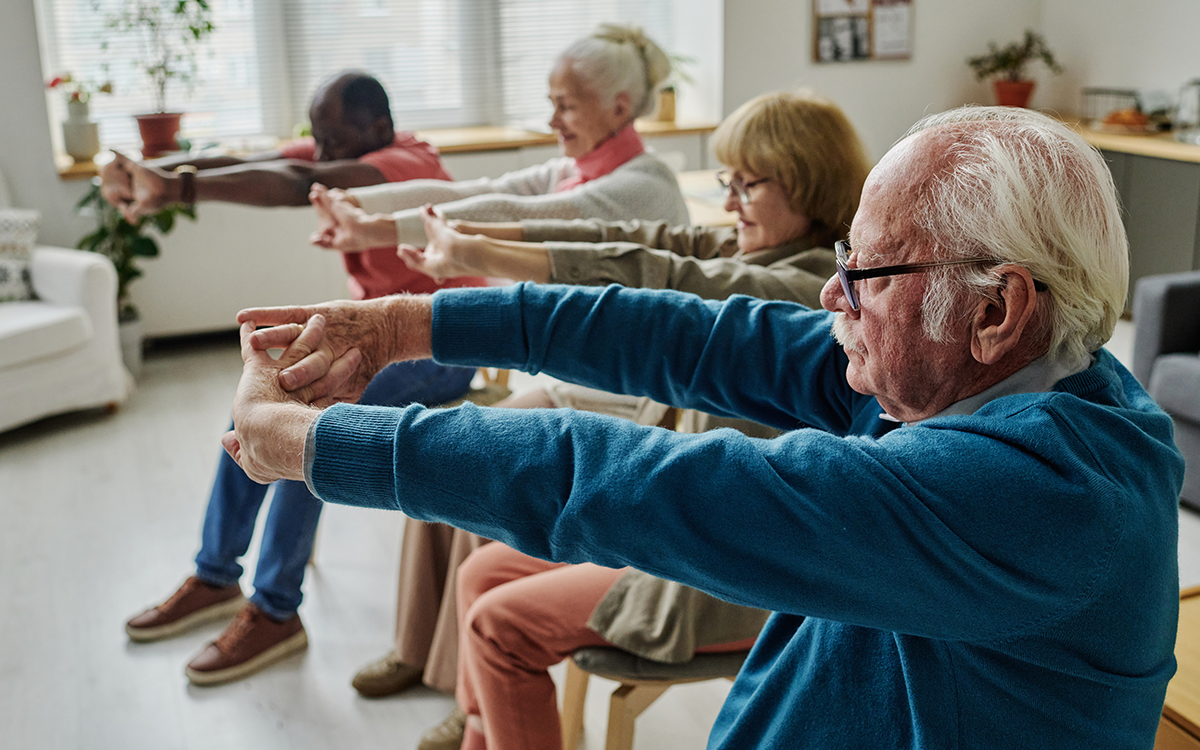Independence is more than a stage of life. It’s a feeling, the quiet pride in making your own choices, harbouring the sense that you are still steering your own story. For seniors, independence is tied to dignity and purpose. But it doesn’t mean standing alone. In fact, independence grows stronger and deeper when rooted in trust and harmony.
As children, we all begin by leaning on our parents. Then, as the years pass, the roles shift. We intrinsically form our own opinions and paths, changing the family dynamic. Eventually, we become the ones our parents lean on. That reversal of roles can be tender, but also complicated. Families may want to help too much, swooping in with solutions, doing everything for their senior loved ones. And while those gestures come from love, they can sometimes carry an unintended sting: you can’t do this on your own anymore.
Living with purpose is a huge part of our values at Verve Senior Living, and we believe it comes from maintaining an all-important balance. The balance between wanting to help and ensure the safety of seniors, and helping too much by taking away the tasks and abilities they still have and cherish. Because when independence and family connection walk hand in hand, life feels more complete.
The Mindset Behind Senior Independence
Families who approach senior independence with openness and empathy discover that helping doesn’t always mean doing. Sometimes it means stepping back and perhaps, even giving space.
Independence isn’t “all or nothing.”
A senior may need help climbing stairs but still delight in cooking a favourite meal. They might lean on family for transportation yet continue to manage their finances or enjoy reading the morning paper with quiet pride. Each small act of autonomy is like a thread, weaving together threads of confidence.
Without these threads, life may feel a bit frayed. Too much dependence can lead to frustration or sadness. But when seniors are encouraged to remain engaged, in mind, body, and spirit, something magical happens. They stay more deeply connected.
Psychologist John Northman from Buffalo, NY puts it beautifully:
“This idea of feeling connected becomes very reinforcing, to all of us, and it contributes to happiness, it contributes to mental health, and it does contribute also to physical health. It’s well known that when people feel better connected, they feel better physically, they’re certainly less likely to feel depressed—or if they do, they’re in a better position to get out of being depressed. Overall, it leads to a feeling of a greater degree of support and connection psychologically,”
Connection and independence are not opposites. They’re companions. One complements the other.
5 Ways Family Members Can Provide Support and Encouragement to Senior Loved Ones
Families often wonder: How do we honor independence without letting our loved ones feel alone? The answer lies in blending gentle support with deep respect. Here are some ways to walk that delicate line:
1. Make plans for the future together
The future doesn’t have to feel like a closed door.
Instead, it can be a shared conversation, a map you draw together. Gather as a family, over coffee or maybe a Sunday meal, and talk openly about what lies ahead.
What are your loved one’s hopes? What are their fears? Which routines matter most to them? These questions may feel unessential but they carry weight. You remind seniors that their voice still leads the way by letting them help make decisions about things like healthcare, safety measures, or even exploring a retirement residence that caters to their needs and preferences.
When it’s time to talk about moving into an independent living residence, frame it as a new beginning. Retirement residences don’t mean giving up your freedom, they simply mean stepping into a place where there are always new opportunities.
2. Encourage Safe Independence at Home
Independence is often in the small things, like picking out what to wear, preparing a favourite dish, or even watering plants by the window. These everyday rituals hold meaning, reminding seniors of who they are.
Families can honor this by making the home environment safer, not smaller. Simple adjustments can go a long way in protecting independence while easing family worries.
Medical alert systems act as a lifeline of reassurance, ensuring help is always close at hand. Thoughtful home modifications like grab rails in bathrooms, better lighting in hallways, or a chair lift on the stairs aren’t just symbols of frailty but bridges to continued freedom. Even something as simple as keeping spaces decluttered, with clear pathways, can reduce accidents and bring more ease to everyday movement.
Think of these changes not as restrictions, but as gentle and quiet guardians of independence.
3. Prioritize Quality Time
Living together or nearby doesn’t always mean you’re truly connecting. Independence thrives when it’s balanced with moments of companionship that feel intentional and joyful.
Whether your senior loved one lives with you, or in a senior living residence, scheduling a specific time to spend together is important. Sure, you may see each other every day because you live together, but quality time spent doing an activity or talking is invaluable. Conversely, if you do live together, the occasional respite will do both parties a world of good to recharge and refuel for all that time spent together.
4. Keep the Conversation Open
Independence also lives in words.
It’s important to remember that everyone has their own opinions and preferences when it comes to what to eat, wear, do, etc. every single day. Voicing these in a calm, open manner is crucial to open communication.
Acknowledging your senior loved one’s abilities, no matter how few or many, is important to that independence we each so value. It’s also up to your senior loved one to acknowledge that children grow up and their judgment on larger issues should be heard and valued as well. It’s a difficult role reversal for many and takes practice.
When conversations stall or emotions run high, journaling or inviting a neutral voice (could be a counselor, a friend, a professional) can help untangle feelings.
5. Celebrate Abilities, Not Limitations
Every ability, no matter how small, is a spark worth celebrating. Maybe your loved one can still organize the grocery list, play the piano, or tend a small herb garden. These little moments can spark great confidence and abundance of joy.
Encourage hobbies, community programs, or volunteering, avenues that allow seniors to continue contributing meaningfully. What matters isn’t the scale of the task, but the sense of purpose it brings.
How To Get the Right Balance
To be honest, this balance between being independent and getting help isn’t always easy. There will be mistakes, times when families worry too much, or times when seniors would resist strongly. But patience, not perfection, is what brings equilibrium.
Ask yourself often: Are we protecting dignity as much as we’re protecting safety? That question can guide your choices.
Every day at Verve Senior Living, we see this balance in action. Seniors do better when they know they can get support if they need it, but they are still free to live their lives on purpose. Families do well too, as worry turns into peace of mind.
Love, Independence, and Everything Between
Independence doesn’t mean walking alone. And family support doesn’t imply being there for everything. It’s about knowing how to respect people’s abilities but being there for them when they need it.
Life becomes not only safe, but truly beautiful, when seniors feel both capable and cherished.
At Verve Senior Living, we believe in nurturing that balance, creating communities where independence blossoms and families share the journey side by side.




